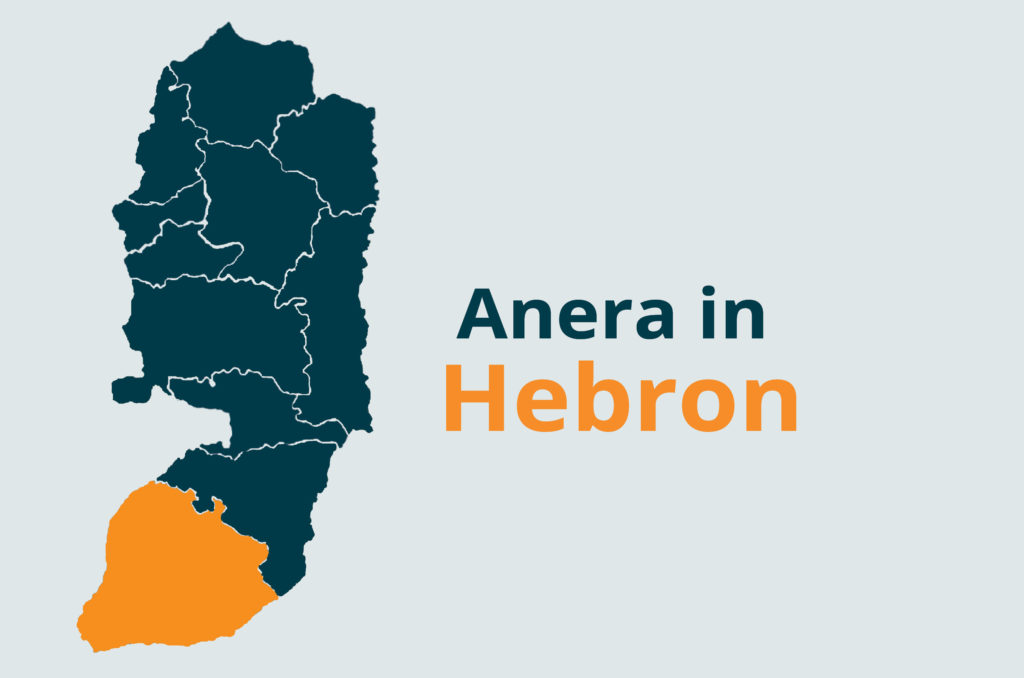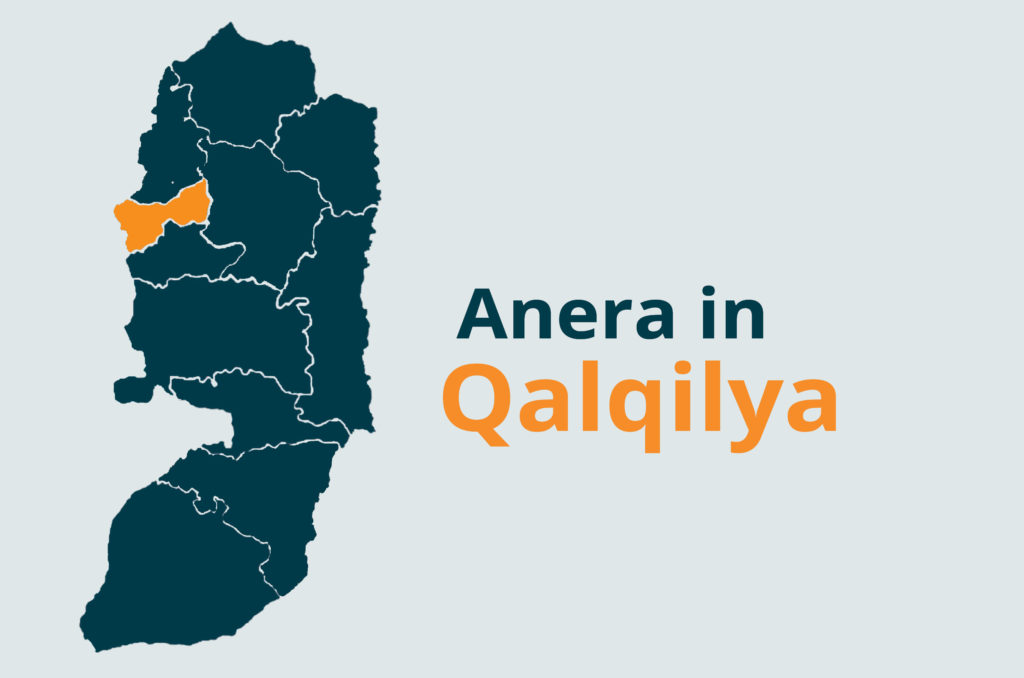Dec, 2015
Nablus takes its name from Roman emperor Neapolis who seized the city in 36 BC.
Nablus Governorate | محافظة نابلس
Located strategically between two mountains with an abundance of natural springs, it has been ruled by many empires over the course of its long history. In the Old City, there are a number of significant archaeological sites dating back to the 15th centuries.
Nablus is also home to the world’s smallest religious community: the Samaritans; an ethno-religious group of the Levant that has a parallel but separate religion to Judaism. Just over 700 people live on Mount Jerzim, where they freely practice their rituals and lead a vibrant cultural life. With all its uniqueness, natural beauty and rich history, Nablus is considered to be an important Palestinian commercial and cultural center, and the capital of the Nablus district, with a population of 348,000.
Nablus includes three refugee camps, eight towns and 43 villages. It faces many obstacles to its development due to encroaching settlements. The Nablus district is home to a dozen Israeli settlements and many more “outposts,” the Israeli name for settlements that are not legal under Israeli law. The resulting lack of available resources combined with restrictions to movement, poverty and unemployment have lead to the following problems:
- Lack of infrastructure to cultivate farmland
- Limited job opportunities
- Inadequate water networks, forcing families to use income to purchase water for household use.
- Crumbling schools and hospitals
- Few spaces or opportunities for socialization and recreation
In response to these issues, Anera has proudly extended its assistance to 35 villages and towns with an array of programs and activities benefiting entire societies, namely farmers, women, youth, students, workers and young children.
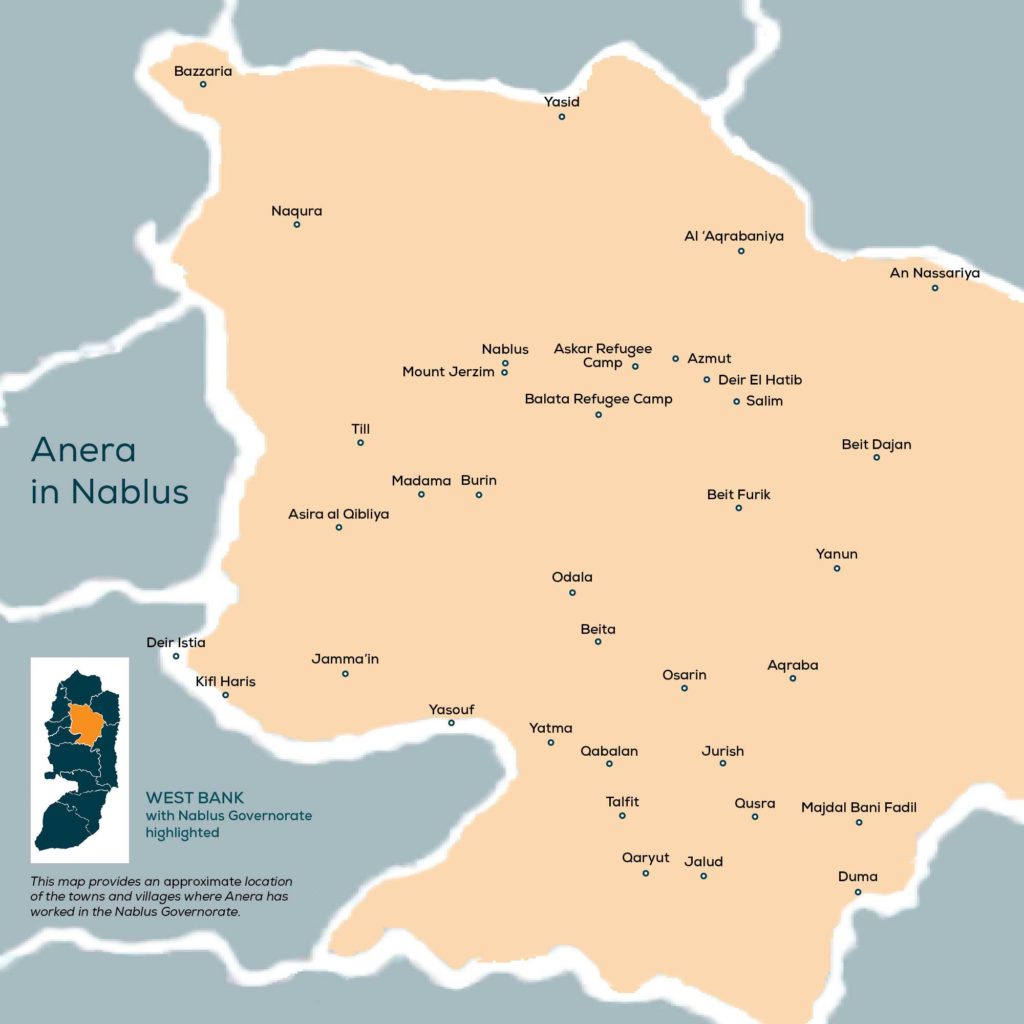

Agricultural Development
PALESTINE LAND RECLAMATION
During the 1980s, Anera implemented an agricultural mechanization program to help farmers enlarge their cultivable land area. Anera bought and distributed 350 pieces of heavy farm equipment, like tractors and bulldozers, to farming cooperatives across Palestine. Members and non-members could rent the machinery at prices lower than the market rate so they could move large rocks, level the ground and plow.
Five Nablus area cooperatives (Yasouf, ‘Asira al Qibliya, Yasid, Nassariya and Deir Istia) received machinery and more than 300 farmers were able to make their fields more productive.
The mechanization program also created jobs for drivers and agricultural engineers, and helped agriculture cooperatives sustain themselves over many years.
NABLUS DAIRY INDUSTRY
Up until the early 1980s, only one company in the West Bank had ventured into local milk production. Along came Anera’s dairy factory project, which helped establish six small-scale factories for the processing of milk products.
The micro-dairies collected milk from local farms at fair prices, processed it in their hygienic facilities and sold it to consumers. The businesses benefited countless of people and families, and most importantly, helped control the brucella disease that spread among cattle.
An Nassariya cooperative in Nablus received a $200,000 grant that provided two feeding bottles and two milking machines to get them started, in addition to training on how to operate the machinery.
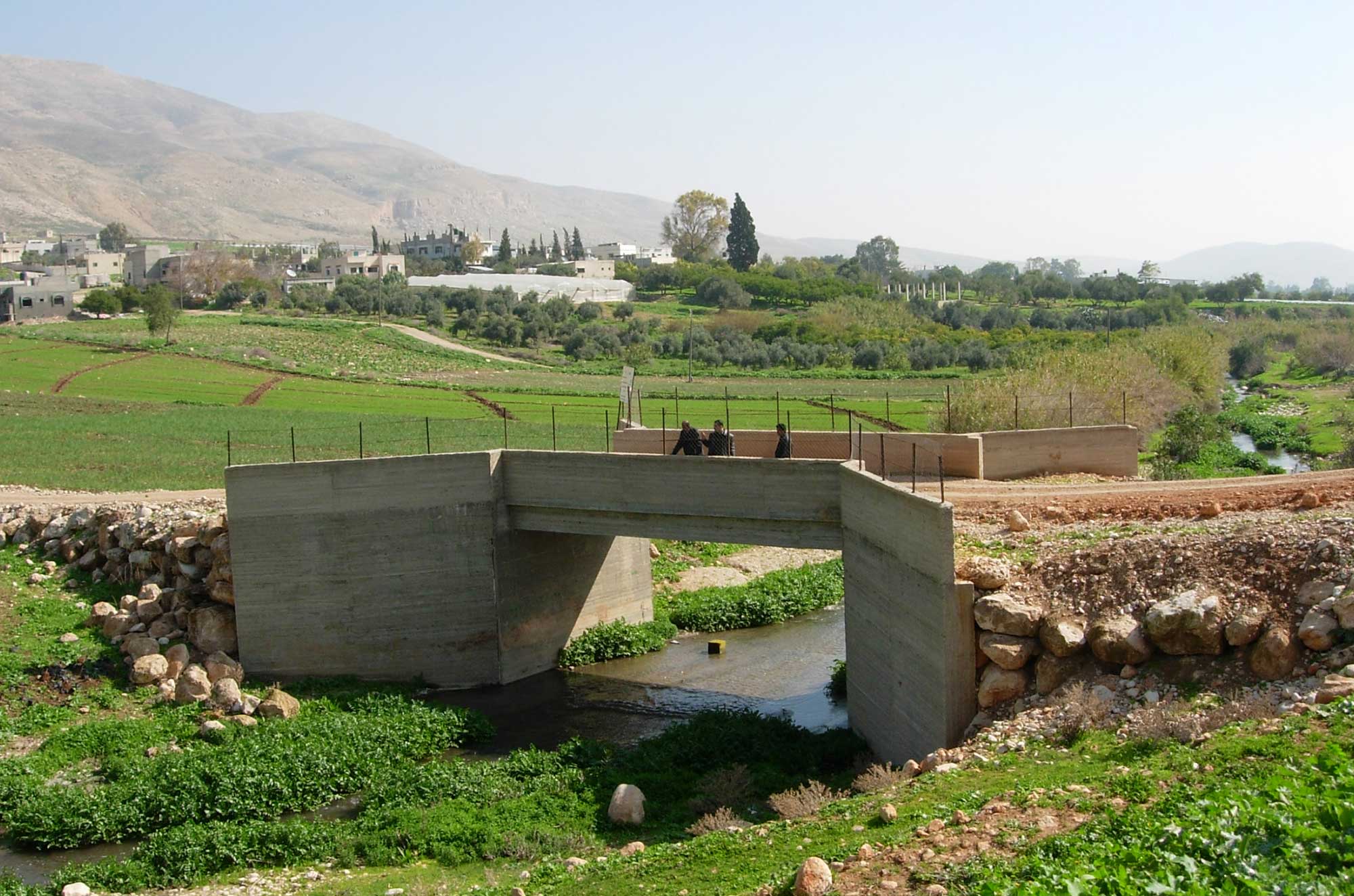

ACCESS ROADS
Between 2003 and 2007, Anera built access roads connecting the villages of Qusra and Jalud, and in ‘Aqraba, Beita and Yatma. Other road construction included culverts, such as those in Yanun and Beita; curbstones and sidewalks in Qabalan; and terracing wall rehabilitation in Qabalan, Salim, Jalud, Beit Furik, ‘Aqraba, Majdal Bani Fadil, Yanun, Beita, Yatma and Qusra.
The roads connected farmers to markets and agricultural lands, encouraging reclamation, increasing production and making goods transportation safer and more convenient.
Urban Development in the Nablus Governorate
In 1986, Anera approached the Municipality of Nablus with a $350,000 grant to establish a new and modern slaughterhouse, since the older one did not meet the needs of consumers. Anera also provided a waste engineer expert who came to Nablus from the USA to prepare technical and hygienic recommendation for this project. The construction was completed during the early 1990s, and it is still functioning to this day.
ECONOMIC DEVELOPMENT
Anera's Women Can program provided, from 2019 to 2020, 100 women in the Nablus and Qalqilya areas with tools and training to open small businesses. The enterprises empower women who are the main breadwinners in their households with an independent source of income. Says Khyria, a baker from Qabalan, who is famous for her giant bread loaves: “The giant size of the loaves makes my bread special. This project [Anera provided her with new equipment] will make baking more efficient and help keep my unique bread alive.”
Back in the 1980s, Anera had a microfinance program that benefited 50+ health, agriculture, education and charitable organizations and societies across the West Bank and Gaza. Two were in the Nablus area, the Electrification Union and Arab Women’s Union. Anera, for example, helped the Women’s Union buy sewing machines in order to support training and encourage women to be independent and self-reliant. A later phase of the same program helped build factories, industrial zones and markets across the West Bank in the 1990s.
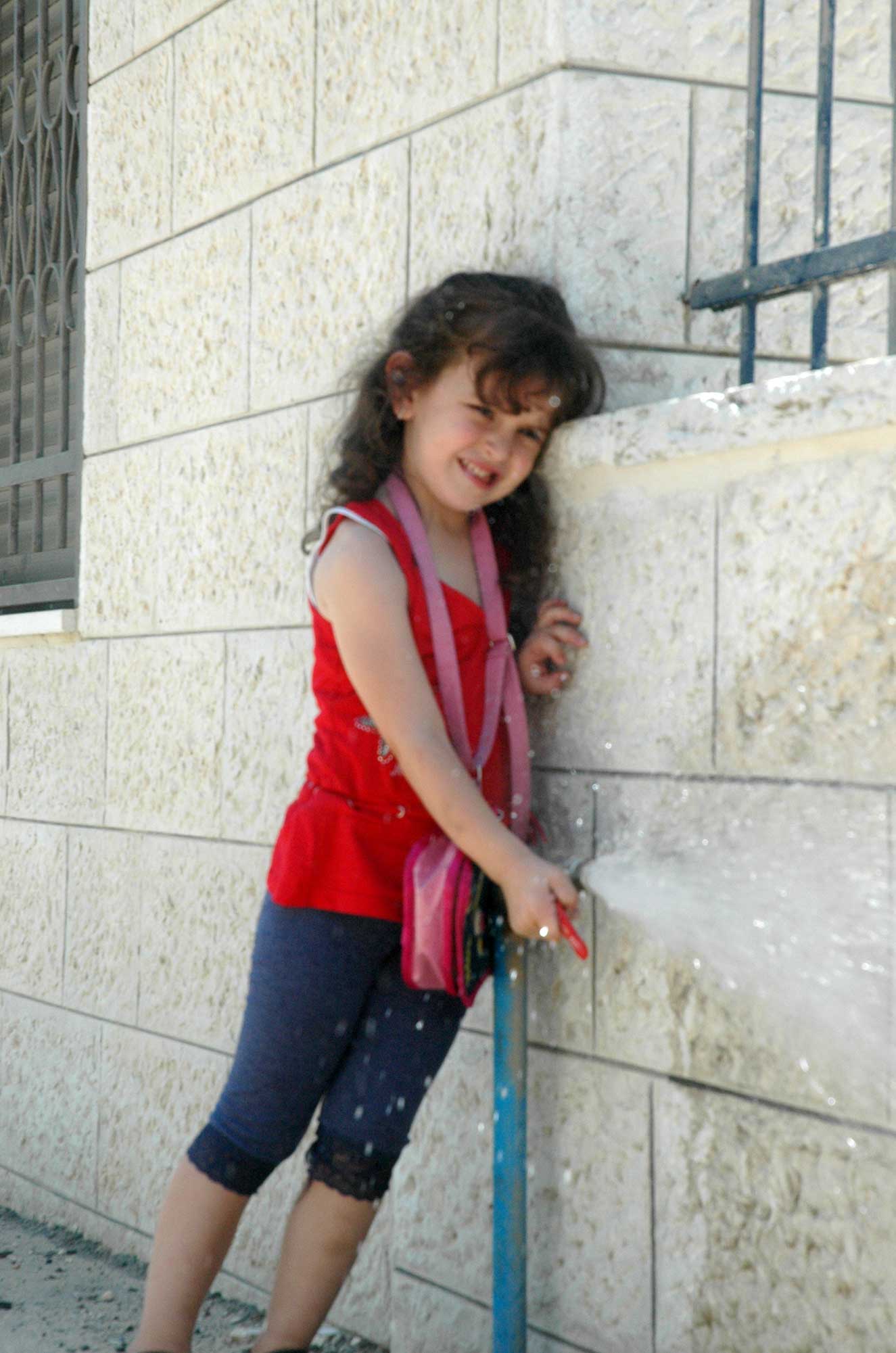

In the mid-2000s, in Nablus, Anera delivered a job-creation training workshops in a number of villages for 130 rural women on the fine art of sewing. The women prepared local exhibitions in their villages after the completion of the training where they were able to sell some of their products. The centers continue to give sewing training to new women each year conducted by members of the local communities.
WATER
For decades Anera has been providing sustainable, reliable and clean water access to Palestinian homes, farms and schools in the Nablus area. In the mid-2000s, Anera built and renovated water cisterns in the villages of Nassariya, Al ‘Aqrabaniya, Beit Dajan, Beit Furik, ‘Aqraba, Talfit, Majdal Bani Fadil, Duma, Osarin, Jurish and Qusra. The cisterns were located in agricultural lands, youth centers and schools, benefiting farmers and students alike. Anera rehabilitated a water spring in Qaryut to benefit all villagers.
From 2008 to 2013, Anera installed reservoirs, pumping systems and water networks in Mount Jerzim, Naqura, ‘Azmut, Burin and Yasid. Residents of these communities now can rely on clean, consistent supplies of water piped into their homes. For many families, they no longer have to pay for expensive deliveries of water from tankers. Each water project has generated hundreds of job opportunities for the people of these villages that directly benefited them and their families.
Through the USAID-funded Palestinian Community Infrastructure Development program, in 2018, Anera built a new 264,000-gallon reservoir and water system for Jamma’in, a mountainous town of more than 8,000 residents. Before Anera's intervention, the water pressure was very poor and many residents lived in areas that were situated above the existing reservoir. They had to rely completely on expensive water of dubious quality that was tankered in.
ACCESS ROADS
Between 2003 and 2007, Anera built access roads connecting the villages of Qusra and Jalud, and in ‘Aqraba, Beita and Yatma. Other road construction included culverts, such as those in Yanun and Beita; curbstones and sidewalks in Qabalan; and terracing wall rehabilitation in Qabalan, Salim, Jalud, Beit Furik, ‘Aqraba, Majdal Bani Fadil, Yanun, Beita, Yatma and Qusra.
The roads connected farmers to markets and agricultural lands, encouraging reclamation, increasing production and making goods transportation safer and more convenient.
URBAN DEVELOPMENT
In 1986, Anera approached the Municipality of Nablus with a $350,000 grant to establish a new and modern slaughterhouse, since the older one did not meet the needs of consumers. Anera also provided a waste engineer expert who came to Nablus from the USA to prepare technical and hygienic recommendation for this project. The construction was completed during the early 1990s, and it is still functioning to this day.
ECONOMIC DEVELOPMENT
Both the Electrification Union and Arab Women’s Union in Nablus have benefited from Anera’s socio-economic and microfinance program that targeted over 50 health, agriculture, education and charitable organizations and societies across the West Bank and Gaza in the 1980s. Anera, for example, helped the Women’s Union buy sewing machines in order to support training and encourage women to be independent and self-reliant. A later phase of the same program would help build factories, industrial zones and markets across the West Bank in the 1990s.
Education for Palestinian Youth in Nablus
School facilities across Palestine suffer from deteriorated classrooms and facilities. The Ministry of Education does not have sufficient funds to fully maintain or develop safe, engaging and healthy educational facilities. Anera steps in where it can to fill the gaps.
In the first decades of the 2000s, in the Nablus villages of Qusra, Jurish, Beit Dajan, Osarin, Majdal Bani Fadil, ‘Aqraba, Odala, Mt. Jerzim and Jalud, and Kifl Haris, Anera built and renovated classrooms, recreational facilities and sanitation systems.
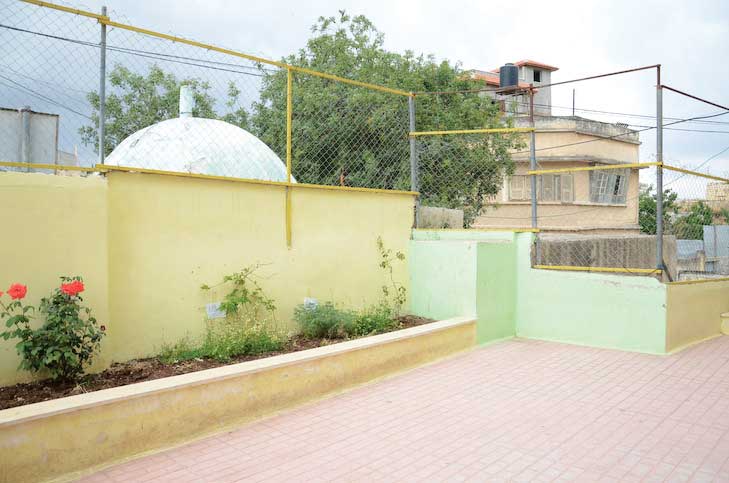

Anera’s early childhood development (ECD) program was piloted in two Nablus preschools: the Askar Refugee Camp preschool and a governmental preschool in the city of Nablus. The governmental preschool was one of only two public preschools in the entire West Bank. Anera transformed both preschools with soft-colored walls and curtains, upgraded playgrounds, new child-friendly furniture and carpeting, educational materials and toys, and a selection of story books and art materials. We also renovated bathrooms, making them child-accessible and easy to use. A teacher at the Askar Refugee Camp preschool describes the transformation. “The preschool just felt tiny and like it was falling apart,” she says. “The renovation and resources have unleashed [the children’s] talents and gifts.”
Since 2018, the Nadia and Ghiath Sukhtian Foundation funded the construction of four preschools in the Nablus governorate, in the towns of Deir El Hatib, Bazzaria, Nassariya and Till. Each preschools accommodates a minimum of 75 children. With funds from an individual donor, Anera established the first governmental kindergarten in the vulnerable village of Madama, south of Nablus city. Again, this school was built to a high standard and currently offers over 50 children a preschool education.
Anera has taught dozens of Nablus-area preschool teachers an educational approach that rests on the fundamentals of early childhood care and education including child development, child rights, learning theories, safety, classroom organization, expressive arts, play and much more.
Improving Healthcare in Nablus
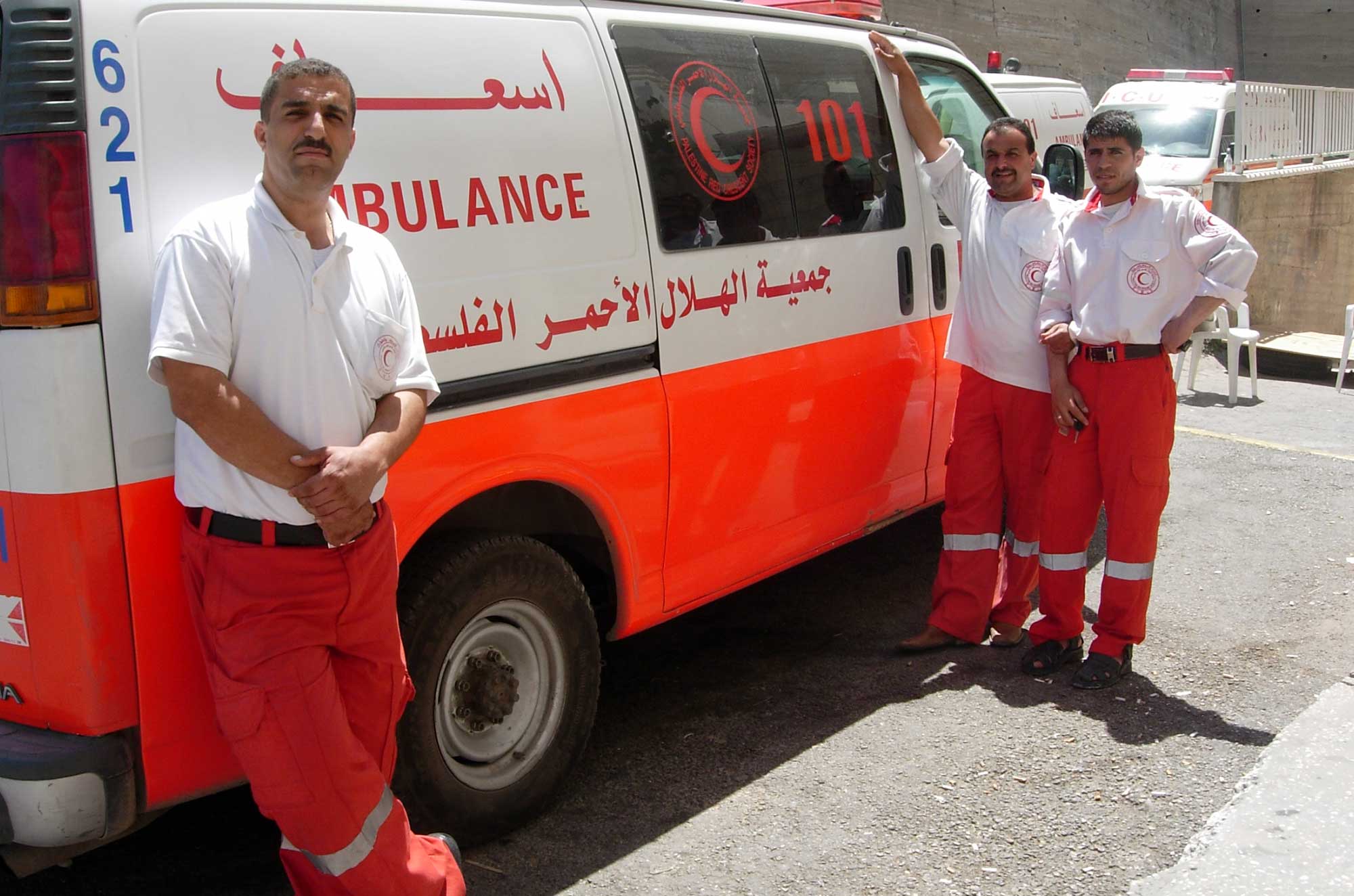

Anera’s in-kind medical and relief deliveries reach clinics and hospitals in Nablus with millions of dollars worth of donated medicines and healthcare supplies. The Family Planning Center, Nablus Red Crescent and the Al-Itihad Hospital, for instance, are able to make medicines available to disadvantaged patients free of charge or for a nominal fee. This means that families, hospitals and clinics can use whatever limited resources they have to fill other important needs.
In the mid-2000s, Anera delivered a mother-child health program throughout Nablus and the West Bank that improved the availability of health services and provided counseling for Palestinian women of reproductive age as well as upgraded infant care and child nutrition. The three-year project reached 113 communities, 78 clinics and hospitals, and 16 municipalities, including Nablus.
Rafidya Hospital in Nablus City is the largest referral hospital in the northern West Bank. From 2005 to 2010, Anera made major renovations to the hospital, including the operating theatres, burn ward, labs, blood bank, physical therapy unit, kitchen, elevators, registration section, main entrance and other areas. Anera also added two operating theatres and equipped them with surgical lights and cameras that enable live transmission during operations for student doctors.
Anera has for many years delivered donated medicines and healthcare supplies to the Itihad Hospital in the city of Nablus as well as to the Yazour Charitable Society in the nearby Balata Palestinian refugee camp. Our medical aid program sends quality, needed medicines to local institutions across Palestine, Lebanon and Jordan so doctors can treat their patients at little or no cost to fill prescriptions.
Culture and Recreation in Nablus
COMMUNITY CENTERS
In 2004-2005, Anera built much-needed community centers in Qaryut, Talfit, Beit Furik and Beit Dajan. The centers were handed over to the village councils and hold an array of activities to this day, like summer camps, trainings, lectures, cultural events and sport activities. They benefit thousands of residents and entire families.
PUBLIC PARK AND SOCCER FIELDS
Many of the small villages in the Nablus area lack safe public places for children and families to come together. To help the communities, Anera built a public park in ‘Aqraba village and two soccer fields in Duma and Majdal. These outdoor havens provide constructive breathing spaces for children and youth. They also give young residents an opportunity to meet and bond over dynamic activities that teach teamwork and cooperation.
MUSIC
Anera’s holistic approach to education, early childhood development and youth programming includes creating opportunities for people to express themselves through music and art – highlighting the arts’ crucial role in strengthening communities and individuals.
In partnership with the Mosaic Foundation and the Edward Said National Conservatory of Music (ESNCM), Anera has given these opportunities to 163 young people in remote and underprivileged areas in the West Bank through close collaboration with schools, community members and other local organizations. Nablus was one of 4 districts the project reached.
In the very successful music program, a new Arab music ensembles formed, a musical summer camp took place, and 12 advanced musicians even got the chance to join the ESNCM student orchestras to continue their enhanced music education. In Nablus, music has remained an important part of life for the community. Today, Anera-supported preschools in Nablus bring music into the classroom. Children sing, dance, and even play instruments (some homemade, others brought in with support from partner organizations). Nablus teachers use their expressive arts training to help their classes learn, grow and develop creativity.

